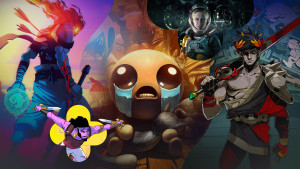Please support Game Informer. Print magazine subscriptions are less than $2 per issue
Kim Wallace’s Top Five Games Of Last Generation
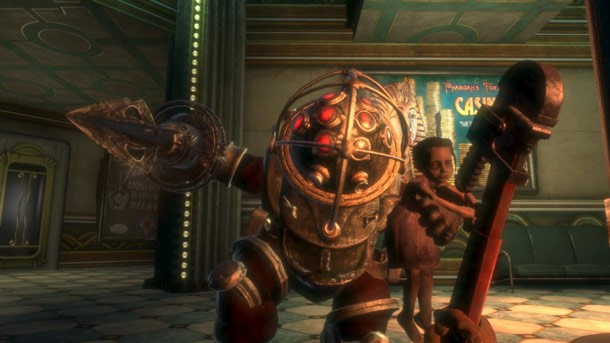
Storytelling has always been very important to me in games; it’s what keeps me hooked and immersed. I’ve often looked at the narrative as the great pay-off for all my hard work to complete a game, so it’s no surprise that the list below features games that told memorable tales.
One of the most exciting parts of video games is watching how storytelling has evolved. Who would have thought that when we started with merely two paddles and a dot on screen that we’d somehow find our way to full blown storytelling, featuring voice acting and important themes? Games are just getting started with where they can take narrative and I can’t wait to see what’s in store as more developers invent new mechanics.
Looking back on my favorite games from the past generation, I noticed a common trend. They all pushed storytelling forward, took risks, and were unique for video games. Some succeed more than others, but the following games left the strongest impact on me.
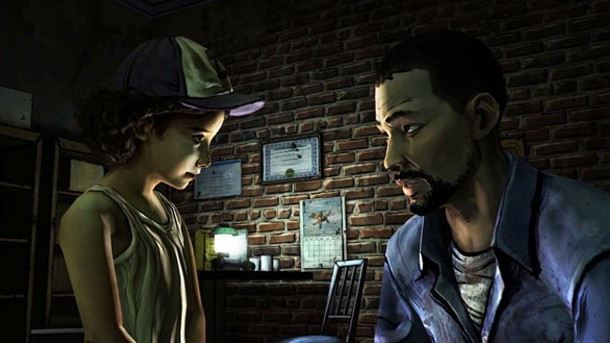
5. The Walking Dead: Season One
The Walking Dead got into my head and heart, agonizing me with its pull-no-punches mentality that matched Robert Kirkman’s tone from the comics. Telltale not only did justice to Kirkman’s work, but weaved its own intense tale about about humanity and our will to survive under the worst circumstances. Part of this is thanks to Telltale creating one of the most captivating characters of all time: Clementine. She factored into all my decisions and I’ve never been so overprotective over a video game character’s life. But what really drove the entire experience was the powerful and heartfelt relationship crafted between Clementine and lead character Lee. Telltale provided plenty of tender moments with some great dialogue options, and it’s how this relationship plays into the ending that’s really a punch in the gut.
The Walking Dead: Season One was unpredictable, jaw-dropping, and put me on an emotional roller coaster. I have a feeling Telltale is just getting started with what it can lend to storytelling and it was refreshing to watch gamers care so much about characters and the story. Telltale’s influence has no doubt brought back the episodic structure, and pushed the medium forward in testing choice and consequence and what really matters to the player.
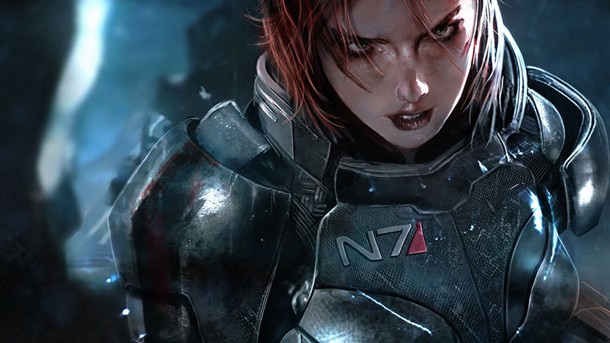
4. Mass Effect
While I equally love the Dragon Age series, I have to give Mass Effect the upper hand for how it challenged choice and consequence while providing an evolving-story over three games. Sometimes BioWare knocked it out of the park, like in the ending of Mass Effect 2, other times the ambition didn’t match people’s expectations, like Mass Effect 3’s finale. Some choices I would have liked seen reflected better, but I can’t deny what an amazing experience it was to be involved in a world-saving, sci-fi narrative, featuring such a badass protagonist, Commander Shepard.
To me, Shepard will always be a woman and playing that character was extremely empowering for me. I liked the ability to play her as a renegade or paragon. Yes, unsurprisingly, I always went the paragon route, but what stands out is the fantastic writing of all the characters, the building of the universe, and how BioWare made you feel the plight of Commander Shepard. It was also the variety of the interactions: Shepard’s hilarious dancing, Tali’s drunken antics, and shooting bottles off the top of the Citadel with Garrus. Then there were the hard-hitting moments, like seeing Mordin righting his wrongs. I feel like I got to know my crew that were willing to risk their lives with my Shep for the better of the world. I was glad to get lost in Mass Effect’s universe and make my own mark in it. I still look back on the world and the characters fondly; they hold some of my best gaming memories last generation. More importantly, I can’t wait to see what BioWare takes from this experience and applies for its games for this new generation.
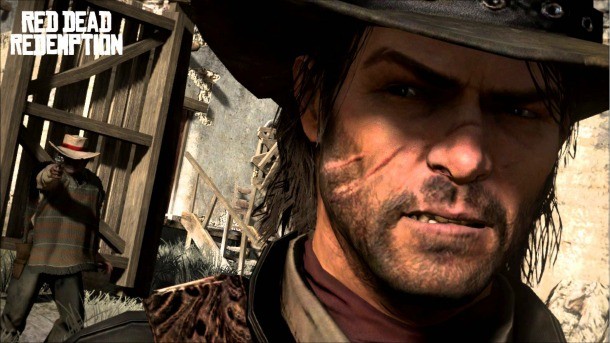
3. Red Dead Redemption
Red Dead Redemption’s world held its own story about the Wild West. Danger lurked around every corner with robberies and murders abound. Seeing the time period brought to life was one thing, but what truly captivated me was the story of former outlaw John Marston. Marston was instantly likeable, even if you knew he had done some unfortunate things in his life, and it’s how Marston fights so hard against his former past that speaks volumes. As Marston hunts down his former gang to make peace with the government, he finds himself right in the middle of a life in he thought he left behind.
The interesting people he meets along the way like rancher Bonnie Marfarlane and grave-robber Seth Briars only enrich the journey, but it’s how Marston’s story turns out that really packs the biggest punch. I don’t want to spoil anything, but the shocking turns and commentary on the brutal time period still stick with me. Red Dead Redemption features one of the better video game endings to date. You see Marston through his journey, but it’s what comes after for him and the family that’s the most impactful. The ending haunts you in the way a good ending should. Rockstar masterfully crafted an exciting world and a powerful narrative to go with it. What I’d give to experience a new chapter in the Red Dead universe...
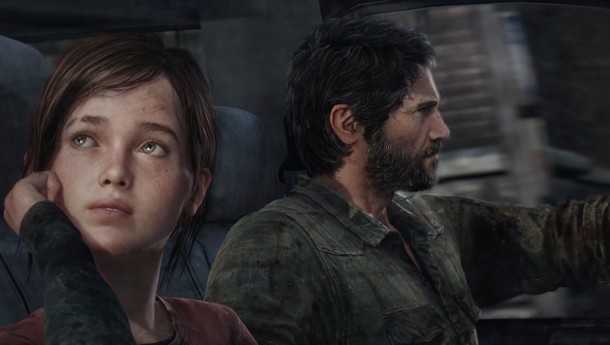
2. The Last Of Us
This might sound weird, but I like The Last of Us because it’s dark. So many times we expect some sort tidy ending that shows characters in the best light. The Last of Us turns that notion on its head. Getting to know Joel and Ellie, who are both dealing with a brutal post-apocalyptic world and their own losses, is intriguing in its own right, but it’s how the two build a bond and care for one another that ends up driving the entire game. Joel has his own demons, and as much as he tries, he can’t keep himself from caring for Ellie. Ellie knows she may hold a cure for the world, and with that comes sacrifice. Both Joel and Ellie grow during the game’s course, but it’s Ellie who really comes into her own as time goes on, making her one of my favorite protagonists. Can you recall winter time in the mountains with her? That was her moment. I like the smaller moments too, like when Ellie just starts rocking out or getting excited about finding a comic.
As much as Ellie and Joel share together, there’s a lot that they don’t say, but still convey, through simple glances or gestures. This all ties into one of the more impactful finales I’ve experienced in a game, exploring how far we’ll go to protect the ones we love. Do we always do what they want or what’s best? The ending is abrupt, unexpected, and just leaves you with a gasp. You’re still thinking about it long after the credits roll. To me, that’s a sign a game has done something right. And none of that would have worked without fostering Ellie and Joel’s bond, making the player care about them. Games writing is still evolving, but this surely was a big step in the right direction.
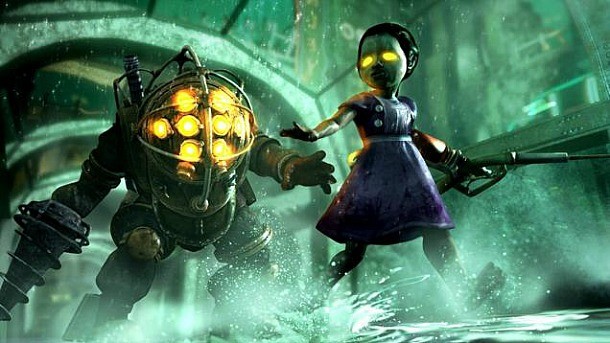
1. BioShock
The BioShock games were by far the most fascinating experiences I had in video games last generation, but if I had to pick a favorite, it’d be the first game. I just love the mechanic of building a fascinating world and letting that world tell its own story via exploration. I don’t want to sound hyperbolic, because the games aren’t entirely there yet, but the Bioshock series reminds me of good literature. Things aren’t spelled out for you, instead you have to connect the dots and draw your own conclusions. I like uncovering different themes and watching them build up. To be blunt, I find Bioshock very smart, and I like games that challenge me to think through the story and issue.
BioShock is the best of both worlds, offering fun gameplay with a strong narrative that leaves you pondering. I’ll never forget the first time I entered Rapture and all the wonderment I had for this underwater city, but what it held was far from the beauty I initially saw. Tucked away were secrets. As you play, you learn more about why Rapture exists, and the ideals mirror Ayn Rand’s Objectivism, where people are driven by self-interests and not altruism. This played into the dilemma placed in front of you with the Little Sisters. Do you save them or harvest them to get stronger?
BioShock does a fantastic job at using storytelling in an interactive format. Developers often struggle to balance gameplay and story; something always seems to take the back seat, but BioShock gets it right. I like that BioShock didn’t just hand me the answers, but forced me to look for them. That’s a smart way to tell a narrative in a video game.

